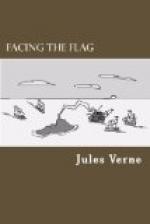“We can no longer believe so, Monsieur the Count, and will withdraw.”
“As you please. Is the Ebba now free to proceed?”
“Certainly.”
“Then au revoir, gentlemen, au revoir, for I am an habitue of this coast and shall soon be back again. I hope that ere my return you will have discovered the author of the outrage, and have Thomas Roch safely back in Healthful House. It is a consummation devoutly to be wished in the interest of the United States—I might even say of the whole world.”
The two officers courteously saluted the Count, who responded with a nod. Captain Spade accompanied them to the gangway, and they were soon making for the cruiser, which had steamed near to pick them up.
Meanwhile the breeze had freshened considerably, and when, at a sign from d’Artigas, Captain Spade set sail again, the Ebba skimmed swiftly through the inlet, and half an hour after was standing out to sea.
For an hour she continued steering east-northeast, and then, the wind, being merely a land breeze, dropped, and the schooner lay becalmed, her sails limp, and her flag drooping like a wet rag. It seemed that it would be impossible for the vessel to continue her voyage that night unless a breeze sprang up, and of this there was no sign.
Since the schooner had cleared the inlet Captain Spade had stood in the bows gazing into the water, now to port, now to starboard, as if on the lookout for something. Presently he shouted in a stentorian voice:
“Furl sail!”
The sailors rushed to their posts, and in an instant the sails came rattling down and were furled.
Was it Count d’Artigas’ intention to wait there till daybreak brought a breeze with it? Presumably, or the sails would have remained hoisted to catch the faintest puff.
A boat was lowered and Captain Spade jumped into it, accompanied by a sailor, who paddled it towards an object that was floating on the water a few yards away.
This object was a small buoy, similar to that which had floated on the bosom of the Neuse when the Ebba lay off Healthful House.
The buoy, with a towline affixed to it, was lifted into the boat that was then paddled to the bow of the Ella, from the deck of which another hawser was cast to the captain, who made it fast to the towline of the buoy. Having dropped the latter overboard again, the captain and the sailor returned to the ship and the boat was hoisted in.
Almost immediately the hawser tautened, and the Elba, though not a stitch of canvas had been set, sped off in an easterly direction at a speed that could not have been less than ten knots an hour.
Night was falling fast, and soon the rapidly receding lights along the American coast were lost in the mist on the horizon.




